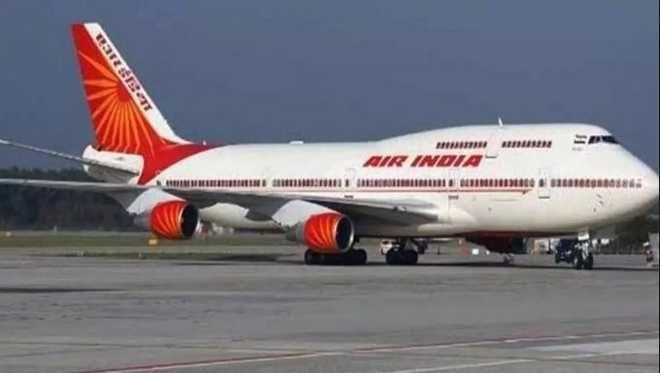Unions Decry Air India Being Offered as ‘Free Gift’ to Tatas, Fear Wage Cuts, Job Losses

Representational use only.
Even as the return of the Maharaja – Air India(AI) – to the Tatas’ fold is being touted as a significant move to turn around the beleaguered national carrier, trade unions have aired deep concern over the sale deal. They believe this transaction is “virtually a free gift” by the Centre to the private group.
Talace Private Limited, a wholly-owned subsidiary of the Tata Sons, emerged last week as the successful bidder to acquire 100% of the debt-laden state-run airline. The winning bid was for an enterprise value of Rs. 18,000 crore – Rs. 2,700 crore in cash and Rs. 15,300 crore in debt takeover – for all the stakes in AI, as well as for the latter’s stake in two other businesses – Air India Express Limited (AIXL) and Air India SATS Airport Services Private Limited (AISATS).
As per the agreement, out of the combined debt of Rs. 61,562 crore of AI and its affiliate companies, debt worth Rs. 45,262 crore will remain with a government entity, namely, Air India Assets Holding Limited, a special purpose vehicle.
Meanwhile, the control of 4,400 domestic and 1,800 international landing and parking slots at domestic airports and 900 slots at airports overseas will be transferred to the Tata Sons group, in a transaction expected to be completed by December this year.
The deal, trade unions say, leaves crores of debt behind with the Centre, which means the airline is a ‘free gift’ to the private company while the taxpayer will bear the burden.
On Wednesday, in a joint statement, Central trade unions (CTUs) termed the AI sale-deal as the “worst-ever perverted economic deal for frittering away [a] national asset”. They added that the consequences of the deal that involved the selling of the “assets [that were] created over decades with public money” for an amount that is “too less” would also harm the public interest at large.
“Several lakhs crores was infused from the national exchequer to expand [AI’s] asset base, [its] huge fleet of aircraft and properties, both in the country and abroad,” the CTUs said in a statement, adding, “only in 2009-10, Rs. 1,10,000 crore was infused in Air India by Govt.”
These assets will now be handed over to the private group, while most of the debt will remain with the Centre as part of the agreement. “This is a gift back to Tata on 75th year of independence after its takeover by Govt. in 1948 followed by its nationalisation,” read the statement, signed by Indian National Trade Union Congress, All India Trade Union Congress, Hind Mazdoor Sabha, Centre of Indian Trade Unions (CITU), All India United Trade Union Centre, Trade Union Coordination Centre, Self Employed Women's Association, All India Central Council of Trade Unions, Labour Progressive Federation, United Trade Union Congress.
The sale of AI means India will be among the few countries where the government will now not own its air carrier, Tapan Sen, general secretary, CITU, told NewsClick , adding that “this means that private airlines can now freely blackmail the government.”
Sen said as such the policy of the Central government to sell public assets was disastrous, as it goes against the interest of the people.
To illustrate his point, Sen pointed out that Air India evacuated thousands of stranded Indians back home from abroad during the pandemic and the subsequent restrictions on movement last year. Furthermore, according to him, it is AI that used to help people during natural disasters.
“Despite its social significance, subsequent governments, over the years, played a role in sinking the public sector airline and it has now been finally sold off to a private group,” he rued.
Indeed, the AI’s experience serves as a textbook case in demonstrating how to first put a Central Public Sector Enterprise (CPSE) in a tough spot and then sell it off to a private player.
Newsclick had earlier reported on how a majority of the huge debt burden of the state-run air carrier and its heavy net losses, which were the ostensible reasons that prompted the Narendra Modi-led government to sell AI, was due to excess aircraft. These aircraft were bought during civil aviation minister Praful Patel’s tenure during the United Progressive Alliance-I regime in 2005.
This was also flagged by the Comptroller and Auditor General (CAG), in its scathing report in 2011. AI’s decision to buy 68 Boeing planes, a move which the then government-approved, imposed an “undue long term financial burden on the carrier,” Reuters quoted the statutory auditory as saying.
Furthermore, the mega-merger deal in 2007 of AI and another domestic carrier Indian Airlines (IA) was also flayed for driving the “final nail in the coffin for AI.” The losses for the National Aviation Company of India Limited (NACIL), which runs Air India, reportedly surged to more than double in 2008-09 compared with 2007-08.
Even as AI is now sold off to the Tata Group, the government must not remain silent about its policies that led to AI's fall. Vilas Girdhar, convenor, Joint Forum of Air India Unions and Associations – a joint body comprising 14 employees’ unions of the airline and its subsidiaries said that “The AI employees are not opposing the privatisation of the airline because they have been fed up by how things were running. Even then, every one of us knows the truth of how the AI was systematically pushed to where it was now".
Moreover, a section of employees with the state-run carrier is also worried about the potential change in their service conditions post-privatisation. As per the media reports, the Tatas will retain all employees of AI for one year from the close of the transaction, after which a voluntary retirement scheme (VRS) could be considered.
The pilots, cabin crew, engineers, among others, shared their apprehensions, as they fear that the private player would resort to wage cuts and other cost-reduction measures to stay competitive in the market. Currently, AI has over 12,000 employees – about 8,000 of them permanent and the rest on a contractual basis.
Get the latest reports & analysis with people's perspective on Protests, movements & deep analytical videos, discussions of the current affairs in your Telegram app. Subscribe to NewsClick's Telegram channel & get Real-Time updates on stories, as they get published on our website.
























